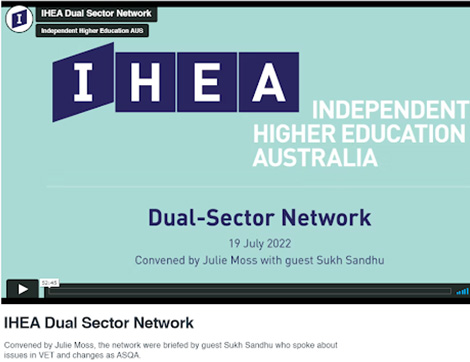
During the IHEA Dual-Sector Network conference, Sukh Sandhu addressed issues and changes in the VET sector.
A recent conference of IHEA Dual Sector Network recognized ASQA’s effort to change its focus from person-centred to system-oriented auditing.
ASQA was also commended for focusing on continuous improvement and self-assurance rather than solely on compliance. Their website includes many more fact sheets and information related to education and training opportunities, which is really helpful for the entire industry.
In addition, it was mentioned that it will be interesting to see how ASQA works as an assurance body for training packages and supports industry clusters.
There were, however, a number of challenges discussed as well, including:
A clear set of guidelines on what’s expected of RTOs – ASQA needs to ensure that it provides clear guidelines regarding what’s expected of each RTO for each clause and the standard. Hence, we should attempt to remove ambiguities to the best of our ability and focus on quality assurance and students throughout the process.
Greater transparency around each and every clause and requirements:
Regulations and requirements must be transparent around each and every clause. There were a number of examples given, including publishing information related to credit transfers, but the second paragraph mentioning best practices that RTOs can follow is very confusing for the industry as in our experience, auditors have audited training organisations on “best practices” rather than compliance requirements. So, what requirements should the training organisations follow? Best practices or compliance requirements or both? To ensure compliance with the regulatory requirements, the regulatory body should clarify this.
Greater flexibility in delivering training and assessment
After COVID-19, we live in a world that requires a lot of flexibility in training and assessment, as well as the regulatory body’s ability to promote and regulate it.
Improving data collection and monitoring
Instead of focusing on tools that are outdated or do not meet client and employer satisfaction requirements, we should focus on tools that are current, reliable and useful.
Development of the new standards
Several of our previous editions has discussed the Department of Education and Training’s work on developing new standards for registered training organisations, which will be published next year. Before they become legislation, these standards should be released to the public so that industry stakeholders can provide feedback, as well as the regulatory body and the Department of Education and Training can receive feedback on their validity and usefulness.
The other topics included:
- The delivery of high-quality training and assessment services
- The regulatory body providing clear benchmarking
- Auditors going through regular professional development training and moderation activities
- Subjectivity that comes into play when auditing and monitoring compliance of training organisations
- ASQA supports and validate their outcomes
- The issues with finding minor administrative issues or issues those have no effect on student’s training and education as non-compliance
- Assisting the sector and stakeholders in a collaborative manner
At the conference, representatives of ASQA took notes on the main points and promised to revisit them at one of the next IHEA conferences.
Comments are closed.